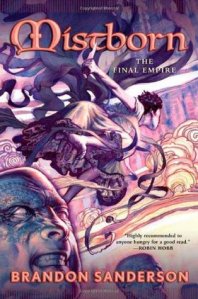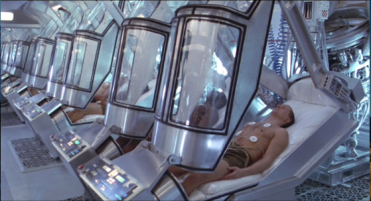Another year passes and another ten trillion books made their weaselly way onto my reading list, but I managed to read 39 of them, so Sisyphus ain’t got nothin’ on me. It was a science fiction-heavy year, and this is a science fiction-heavy list, but I’m unapologetic! Bring on the Future! Of the books I read and reviewed in 2014, here are my top ten.
10. The Woman in the Dunes by Kobo Abe
Kobo Abe goes full Twilight Zone in this Kafkaesque novel about futility. In a nightmarish series of events, a professional man on holiday stumbles into a dune-side village and finds himself a prisoner at the bottom of a sand pit where he must continuously shovel sand to keep from being buried alive. Read the Review Buy the Book Go to Goodreads
9. Seraphina by Rebecca Hartman
Strong female heroine? Check. Compelling subplots of socioeconomic and racial differences? Check. Positive message about body image? Check. Dragons? Check, CHECK, CHECK. Rachel Hartman is building a beautiful universe with Seraphina, the first of this young adult series, filled with complex politics and shape-shifting dragons. Seraphina is a young court musician who must hide her mixed lineage from a bigoted society, but for all her efforts, the young resourceful girl still wraps herself up in a murder mystery and the deadly politics of two nations on the verge of all out war. Read the Review Buy the Book Go to Goodreads
8. Dracula by Bram Stoker
Twilight fiends beware: Dracula is not the inspiration for the glittering, abusive boyfriend of Stephanie Meyer’s blockbuster hit. This is the story of one man’s PTSD after encountering one of the most horrific predators in literature. If you don’t think you can handle the fear, the darkness, the soul-sucking solitude of Bram Stoker’s classic, don’t panic–Dr. Abraham Van Helsing will make sure you survive the night. Read the Review Buy the Book Go to Goodreads
7. The Sun Also Rises by Ernest Hemingway
There are few things I love to read more than stories wealthy, entitled young people leading lives of wanton excess and torturing themselves with unrequited lust in the heat of the Spanish countryside while intoxicated on authentic leather skins of cheap wine, and in this highly specific genre of literature, Ernest Hemingway is king. Read the Review Buy the Book Go to Goodreads
6. Spin by Robert Charles Wilson
Three children witness the stars disappear on one fateful October night on Earth. Jason and Diane Lawton and best friend Tyler Dupree all face the post-Spin world differently, but their fates–as well as the fate of the rest of humanity–tie them together as they journey to discover how their entire planet was encased in a physics-defying dome. Read the Review Buy the Book Go to Goodreads
5. Mistborn by Brandon Sanderson
If there’s one person who can renew age-old stories of revenge, magic, and prophesy, it’s Brandon Sanderson. In Mistborn, the first of a series, Vin, a street urchin and bottom rung of a gang of con artists, wakes up to find her world changed when she meets Kelsier, a legendary Mistborn who can ingest metals and use their magical properties to alter himself and the world around him. Kelsier teaches the gifted Vin everything he knows, and together the two take on the seemingly immortal Lord Ruler and his oppressive Final Empire. Read the Review Buy the Book Go to Goodreads
4. Jonathan Strange & Mr Norrell by Susanna Clarke
Don’t be fooled by the fact that it took me four years to read and I only happened to finish it in 2014. JS&MN is probably going to find its place among my favorite books of all time, because somehow, probably through some authorly incantations of her own, Susanna Clarke makes 1,006 pages fly by faster than a smoke break on a Monday afternoon. Mr Norrell takes up a personal mission to bring magic back to 19th Century England. His apprentice, the dashing young Jonathan Strange, takes up the same mission but with jarringly different methods. The two engage in the rivalry of all rivalries. Read the Review Buy the Book Go to Goodreads
3. The Shining Girls by Lauren Beukes
Criminal Minds meets Star Trek-level space-time continuum plot twists. Lauren Beukes’s dangerously enthralling crime thriller made its way to the top of my list for its originality, unique tone, and sheer entertainment value. Read the Review Buy the Book Go to Goodreads
2. Wolf in White Van by John Darnielle
My penchant for creepiness extends to all areas of my life, but finding creepiness in a book is my favorite. John Darnielle takes a brief hiatus from brilliant songwriting to grace the literary world with his tragic and grotesque storytelling in Wolf in White Van. Sean Phillips creates a refuge from his horrific past in the form of a play-by-mail role playing game called Trace Italian. When two misguided teens become obsessed with the game, Sean must do what he fears most: face himself. Read the Review Buy the Book Go to Goodreads
Of all the book review blogs in all the Internet, this book had to walk into mine. It’s the ultimate, bestest, most favorite book I read in all of 2014:
Ancillary Justice by Ann Leckie
No book comes close to generating the enthusiasm I felt for Ann Leckie’s Hugo, Nebula, Arthur C. Clarke Award-winning debut novel Ancillary Justice. In a fresh take on AI, Leckie tells the story of Breq, a human body inhabited by the last remaining ancillary of the massive artificial intelligence that operated a battleship and its soldiers. As she unfolds her past, Breq’s current mission of stone-cold space revenge becomes clearer and clearer. Leckie’s brilliant depiction of personhood and perspective come alive in this heartbreaking sci-fi saga about one individual’s terrible loss and terrible thirst for vengeance. Read the Review Buy the Book Go to Goodreads
I’m looking forward to a new year and tackling the mountain of unread books that haunt my dreams every night. A huge thank you to my followers and visitors! LitBeetle would be nothing if not for you! Now let me know in the comments which books were your favorites to read in the great year of 2014!


















